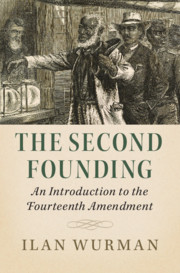2 results
Introduction
-
- Book:
- The Second Founding
- Published online:
- 30 October 2020
- Print publication:
- 12 November 2020, pp 1-12
-
- Chapter
- Export citation

The Second Founding
- An Introduction to the Fourteenth Amendment
-
- Published online:
- 30 October 2020
- Print publication:
- 12 November 2020

